|
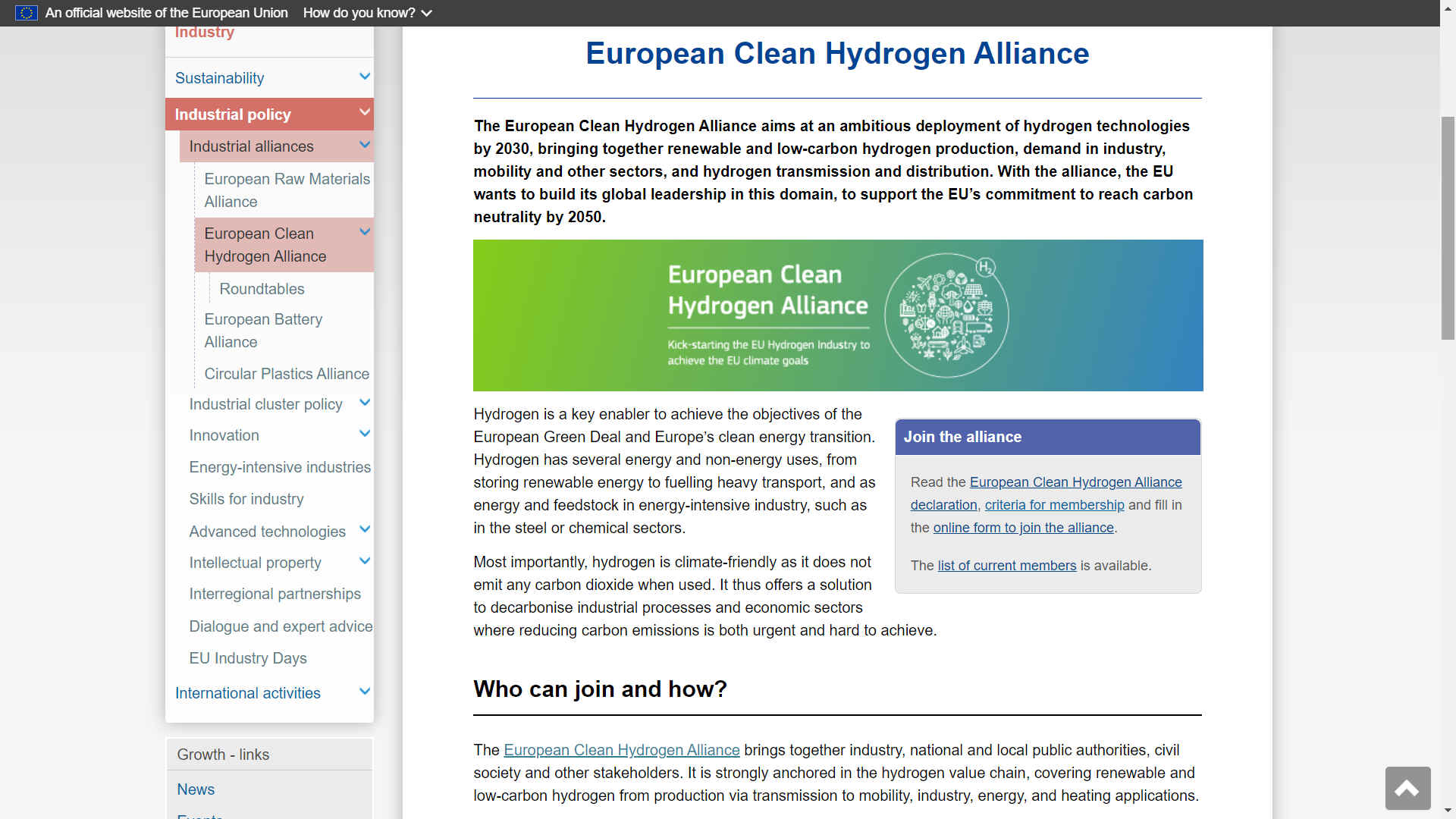
The 'European Alliance' is not strictly speaking European, where a number of
countries in Europe are included, but one excluded. What they really mean is
the European Union and potential EU candidates, excluding others in Europe
who do not cotton to all of the EU rules and regulations, or possibly grieved
those in power within the EU.
Just
as we thought the remnants of both World Wars were firmly put to bed with
the United Nations' COP 21 Paris
Agreement and Sustainability
Development Goals (SDGs): 7 (affordable
clean energy), 10 (reduced
inequalities), 11 (sustainable
cities & communities), 13 (climate
action), 17 (partnerships
for the goals), the policy makers in the European Union appear to have initiated
a new period of cooperative difficulties , stemming from the ashes of Brexit
perhaps, with the deliberate exclusion from the so-called 'European' Clean
Hydrogen Alliance (ECHA). The
name of this association is not accurate and may need to be changed in our
view, to avoid any potential disadvantaging and commercial inequality, where
discrimination is of course unlawful under EU law, via the European
Convention on Human Rights, and Universal
Declaration. We would argue that this Alliance, given its political
nature, must comply with HR law - and seek to promote the SDGs free of
discrimination. Hence, the administrators may want to think about a name
change to reflect the exclusion
of the UK, and yet still claim to be 'European,' or representative of
Europe. That said, this may be an
administrative (compliance) error that we will be seeking clarification on
at a high level. If
the UK is to be excluded, the name should be: European Union Clean Hydrogen
Alliance, or EU Clean Hydrogen Alliance. It is an easy way to rectify. What do you think? Otherwise,
and apart from the EIC fund, the UK appears to be eligible and supported
(with our grateful thanks) as
follows: 1.
Through the Trade and Cooperation Agreement between the EU and the UK (TCA). All
aspects of UK association to Horizon Europe were agreed on 24 December 2020 in the TCA and documents attached to the Agreement. Association will enter into force through the formal adoption of a Protocol that is already agreed in principle, after the Horizon Europe Regulation has been adopted. No additional negotiations are foreseen.
2. The Trade and Cooperation Agreement (TCA) has been provisionally applied since 1st
January 2021. We are assured that it will be definitively adopted after receiving the consent of the European Parliament.
3. In addition, Horizon Europe will also be open to the association of other third countries and territories located anywhere in the world and that share the EU’s fundamental values, as well as have a good capacity in science, technology and innovation, in line with the requirements of Article [12] (1)(d) of the Horizon Europe Regulation.
4. With effect from 1 July 2021, the provision of UK National Contact Point (NCP) services for the Energy theme under Horizon Europe will be transferring to
Innovate
UK. The NCP services for the Energy theme will then be offered alongside those for the Mobility and Climate themes, which together form a Cluster under the new
Horizon Europe Work Programme and governance structures.
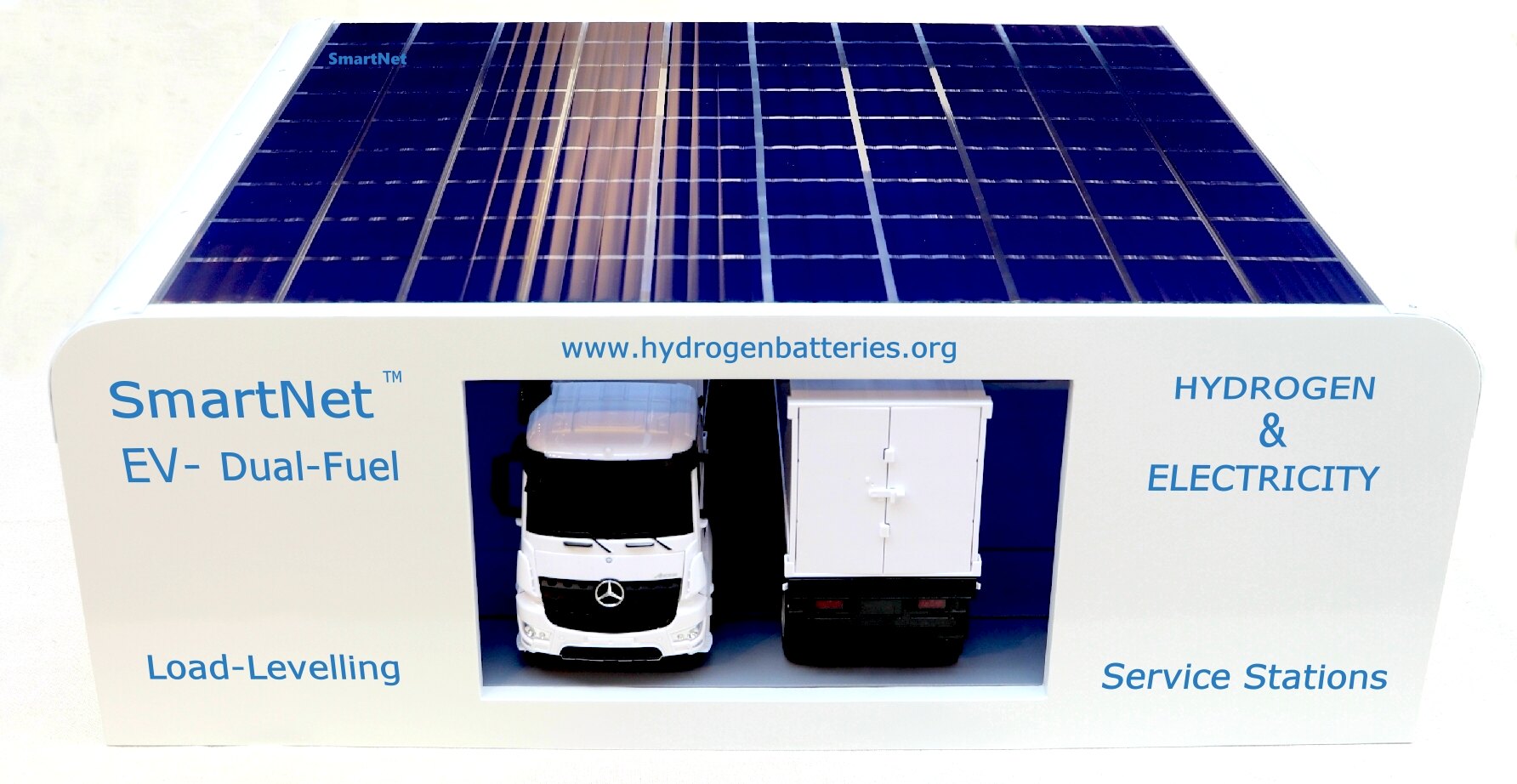
POTENTIAL
GREEN HYDROGEN BOOSTER - The same service station that provides freshly charged 'green
hydrogen' batteries, doubles up as an energy store for the national grid of
the country concerned, boosting 'green
deal' hydrogen production, and reducing CAPEX. That's the beauty of
versatile servicing ( dual
fuel capability, multi-functionality) as flat-packed service stations making E-Mobility more
affordable. These units also supply electricity for conventional rapid
(plug-in) charging and hydrogen gas filling - all in one unit - with the
kicker being automated energy exchanges for robotrucks
and taxis,
where there are no people in these autonomous transport chains to effect
refills.
The
picture above is a 1:20 scale model, so don't get too excited and try to
place an order. We need your help to get to the full-size demonstration
stage, perhaps via a consortium - as a hop-on partner.
This
is a 3.6 - 7.2MW station design at present. You'd need 135 of these beauties
to = the 1GW current EU capacity. So 810 units in Europe to satisfy 'Phase
1' (6GW) by 2024. 'Phase 2' would need 5,400 SmartNet™ stations to equal
40GW by 2030. Subject to confirmation during RIA R&D, it could be that
these smart service facilities are part of the solution that Europe seeks in
meeting their green hydrogen targets.
There
are 600,000 fossil
fuel stations in the world that need to be replaced to eliminate our
reliance on ICE
vehicles in the long term. We are not saying we don't need diesel. We need
to work with stakeholders to ensure a smooth transition, hoping for the
reciprocal.
EU PROPOSAL TO SET UP A CLEAN HYDROGEN PARTNERSHIP FOR EUROPE
The European Commission presented on 23 February 2021 its proposal to set-up 10 new European Partnerships and invest nearly €10 billion for the
'green
deal' and digital transition.
Among these, the Clean Hydrogen Partnership will be building on the work of the Fuel Cells and Hydrogen Joint Undertaking, to accelerate the development and deployment of a European value chain for clean hydrogen technologies. It will focus on producing, distributing and storing clean hydrogen and, on supplying sectors that are hard to decarbonise, such as heavy industries and
heavy-duty transport applications.
Together with the Hydrogen Alliance, the partnership will contribute to the achievement of the Union’s objectives put forward in the
Green Deal and, more specifically, in the EU hydrogen strategy for a climate-neutral Europe.
“We welcome the proposal of the European Commission to set up the Clean Hydrogen Partnership. This initiative is a clear evidence of the success of the FCH JU, which managed to put Europe in a leadership position in FCH technologies such as electrolysis and supported the development of integrated
hydrogen ecosystems (“hydrogen valleys”) in various European regions. We will continue to work
relentlessly to develop and promote hydrogen technologies in Europe, realising their full potential in achieving carbon-clean energy systems and ultimately a climate-neutral Europe. We are happy to be shaping together with the other partnerships the future of a green and competitive European economy”, said
Bart Biebuyck, FCH JU Executive Director.
Since its setup in 2008, the FCH JU has funded 285 research and demonstration projects, with an overall budget of over
€1 billion Euros.
The Commission’s proposal for a Regulation, the Single Basic Act, will be adopted by the Council of the
European
Union, following consultation with the European Parliament and the Economic and Social Committee.
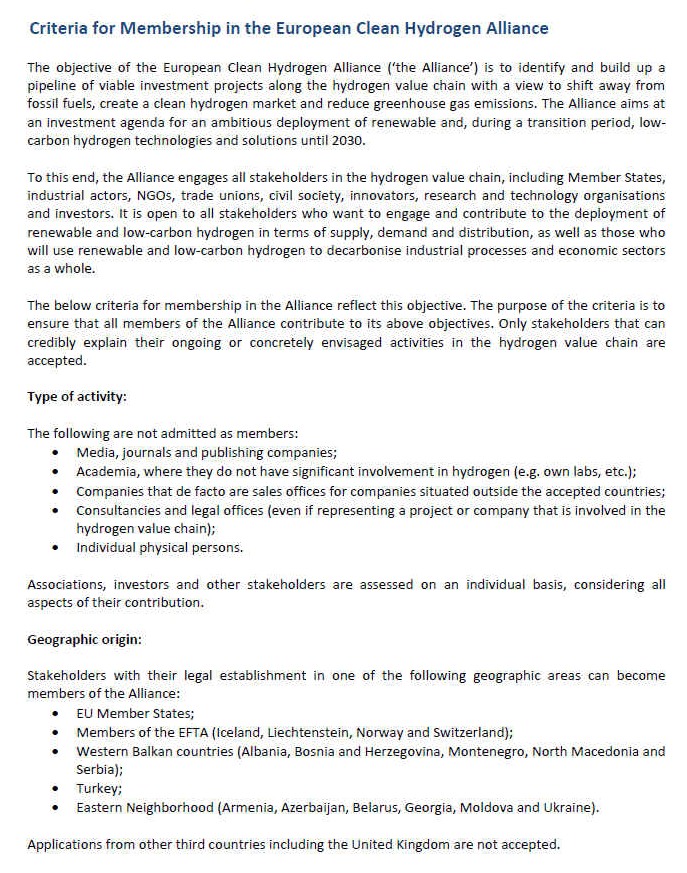
EU
MEMBERS: Albania, Austria, Belgium, Bulgaria, Croatia, Republic of Cyprus, Czech Republic
(Czechia), Denmark, Estonia, Finland, France, Germany, Greece, Hungary, Ireland, Italy, Latvia, Lithuania, Luxembourg, Malta, Netherlands, Poland, Portugal, Romania, Slovakia, Slovenia, Spain, Sweden.
OTHERS
ALLOWED: Armenia, Azerbaijan, Belarus, Bosnia and Herzegovina, Georgia,
Iceland, Liechtenstein, Moldova, Montenegro, North Macedonia, Norway,
Switzerland, Serbia, Turkey,
Ukraine.
EXCLUDED:
United Kingdom
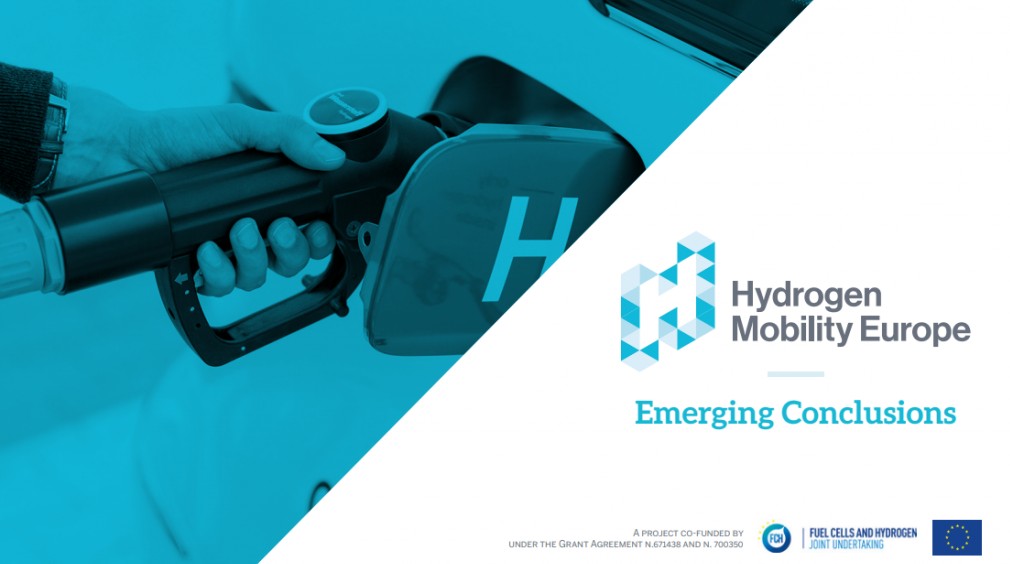
PUBLISHED
- CRITERIA FOR MEMBERSHIP IN THE EUROPEAN CLEAN H2 ALLIANCE
The objective of the European Clean Hydrogen Alliance (‘the Alliance’) is to identify and build up a pipeline of viable investment projects along the hydrogen value chain with a view to shift away from fossil fuels, create a clean hydrogen market and reduce greenhouse gas emissions. The Alliance aims at an investment agenda for an ambitious deployment of renewable and, during a transition period, low-carbon hydrogen technologies and solutions until 2030. To this end, the Alliance engages all stakeholders in the hydrogen value chain, including Member States, industrial actors, NGOs, trade unions, civil society, innovators, research and technology organisations and investors. It is open to all stakeholders who want to engage and contribute to the deployment of renewable and low-carbon hydrogen in terms of supply, demand and distribution, as well as those who will use renewable and low-carbon hydrogen to decarbonise industrial processes and economic sectors as a whole. The below criteria for membership in the Alliance reflect this objective. The purpose of the criteria is to ensure that all members of the Alliance contribute to its above objectives. Only stakeholders that can credibly explain their ongoing or concretely envisaged activities in the hydrogen value chain are accepted. Type of activity: The following are not admitted as members: Media, journals and publishing companies;
Academia, where they do not have significant involvement in hydrogen (e.g. own labs, etc.);
Companies that de facto are sales offices for companies situated outside the accepted countries;
Consultancies and legal offices (even if representing a project or company that is involved in the hydrogen value chain);
Individual physical persons. Associations, investors and other stakeholders are assessed on an individual basis, considering all aspects of their contribution. Geographic origin:
Stakeholders with their legal establishment in one of the following geographic areas can become members of the Alliance: EU Member States;
Members of the EFTA (Iceland, Liechtenstein, Norway and Switzerland);
Western Balkan countries (Albania, Bosnia and Herzegovina, Montenegro, North Macedonia and Serbia);
Turkey;
Eastern Neighborhood (Armenia, Azerbaijan, Belarus, Georgia, Moldova and Ukraine). Applications from other third countries including the United Kingdom are not accepted.
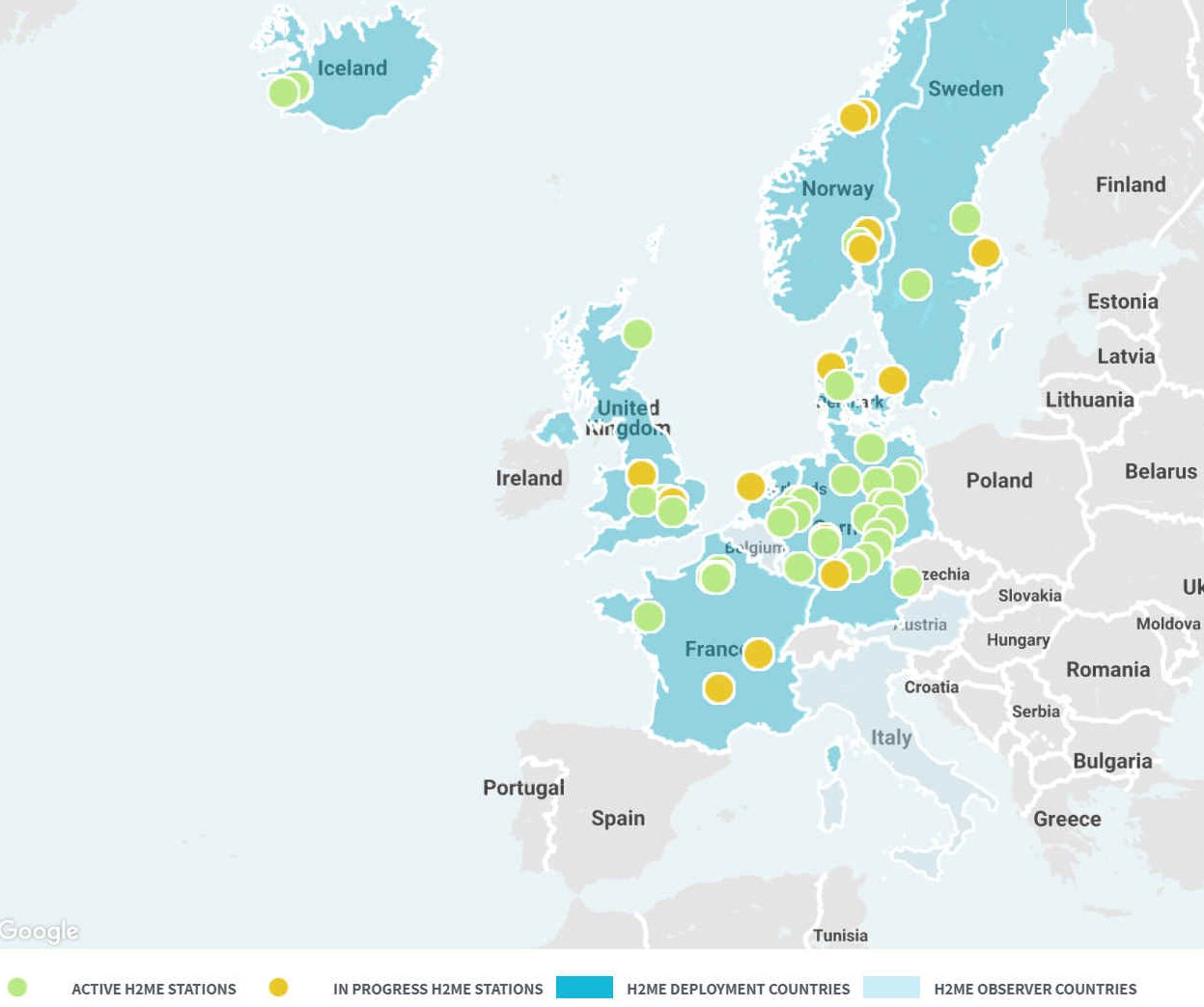
HYDROGEN MOBILITY EUROPE (H2ME) PHASE 1 - EMERGING CONCLUSIONS
14 JAN 2021
The H2ME initiative is a flagship European project, deploying hundreds of fuel cell hydrogen cars, vans and trucks and the associated refuelling infrastructure, across 8 countries in Europe.
It will create the first truly pan-European network, and the world’s largest network of hydrogen refuelling stations.
Rather strangely, although the United Kingdom is included in the H2ME
project, the country is specifically excluded from the European Clean
Hydrogen Alliance, following Brexit. It's almost as though the wartime
enemies, France and Germany, have clubbed together in some kind of hydrogen
cold war, contrary to the express provisions of the Paris Agreement and
United Nations SDGs. As you can see from the map, Germany is leading the
charge in hydrogen service stations.
Austria, Belgium, Bulgaria, Croatia, Republic of Cyprus, Czech Republic (Czechia), Denmark, Estonia, Finland, France, Germany, Greece, Hungary, Ireland, Italy, Latvia, Lithuania, Luxembourg, Malta, Netherlands, Poland, Portugal, Romania, Slovakia, Slovenia, Spain, Sweden.
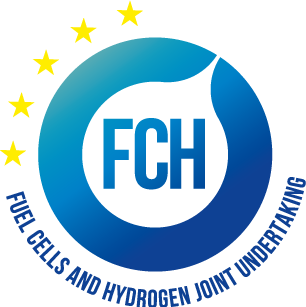
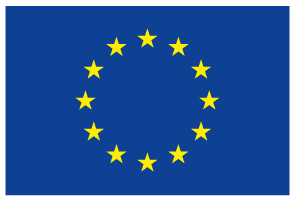 LINKS
& REFERENCE - Please note that links change with time & may not
still be live https://h2me.eu/
https://h2me.eu/publications/emerging-conclusions-2021-h2me-phase-1/
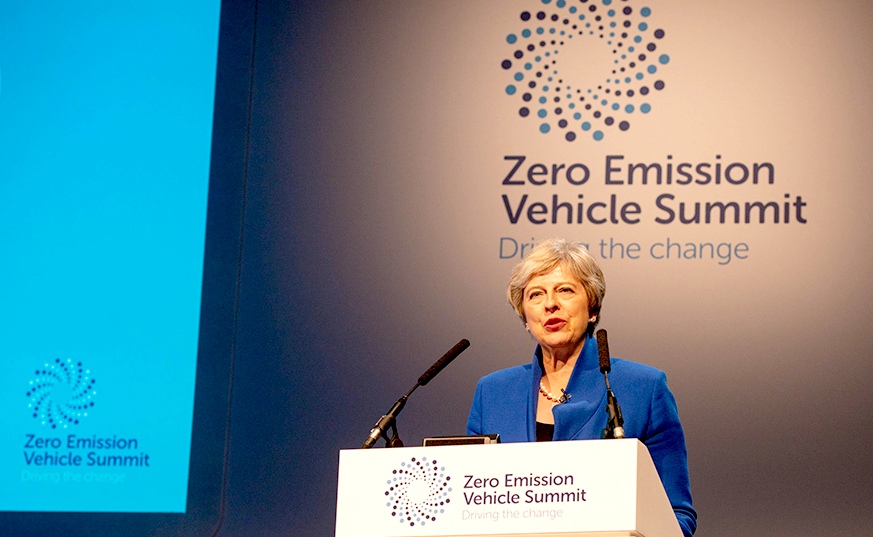
In
2018 Theresa
May kicked the ball into touch with her plan for a cleaner Britain
and sustainable motoring, without giving details, so attracting some
criticism. Since then, from 2030 the Conservative government has banned the
sale of diesel and petrol cars from 2030, with a requirement for zero
emission vehicles by 2035.
Please
use our A-Z
INDEX to navigate this site
This
website is provided on a free basis as a public information service.
copyright © Climate Change Trust 2021. Solar
Studios, BN271RF, United Kingdom.
|







